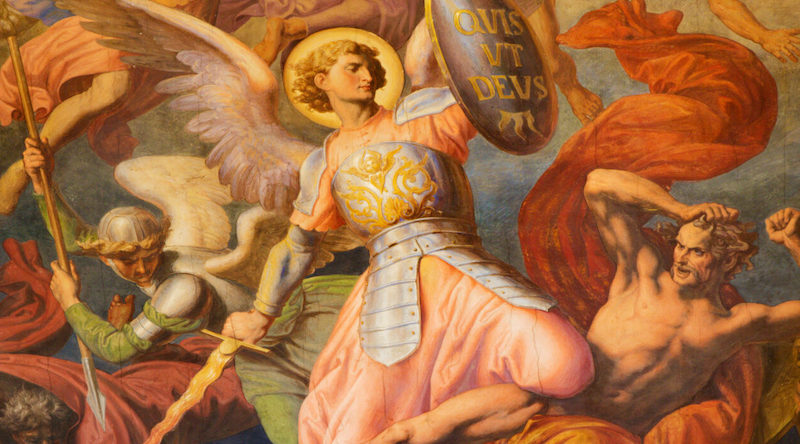If you flip through a Roman Missal and examine the Prefaces—that is, the priestly prayer directly preceding the Sanctus of the Mass—for all the different liturgical seasons, feasts, votive Masses, and the like, you might be impressed by the comparatively large number: there are over 50! That’s not even including the Marian Missal or the prefaces that have been “retired.” All together, there are over 150. But despite their plurality and variety, there is one thing that these Prefaces all have in common. Every Preface ends by invoking the angelic hosts: “In the company of the angels we praise your name, O Lord…” Saint John Chrysostom speaks of the angelic presence in his treatise De Sacerdotio: “At that moment [of celebrating the mass] Angels surround…the whole of the sanctuary, and the place around the altar is filled with heavenly powers in honour of Him who lies there.”
Angels surrounding the King of heaven is unsurprising. But each of us is made in the image of that same King, and as sons and daughters of God each of us has a guardian angel who accompanies us at all times (ST I, q. 113, a. 2). Watching over you every hour of the day and night is a supernatural being more powerful than any superhero you could name. Their undeviating mission is your attainment of heaven. They never waver in this task, unlike us, who are constantly forgetting our purpose in life, “distracted from distraction by distraction,” as T.S Eliot puts it (The Four Quartets: Burnt Norton, III). C.S. Lewis, in his novel Perelandra, describes looking upon the faces of “angels” in this way:
“One single changless expression—so clear that it hurt and dazzled him—was stamped on each and there was nothing else there at all…What this one thing was he could not be certain. He concluded in the end that it was charity. But it was terrifyingly different from the expression of human charity… Pure, spiritual, intellectual love shot from their faces like barbed lighting. It was so unlike the love we experience that its expression could easily be mistaken for ferocity.”
We are so accustomed to popular angelic depictions—from the goofy Angels in the Outfield and the homely Clarence of It’s a Wonderful Life to the myriads of cringe-worthy films depicting angels and demons locked in dubiously choreographed struggles—that we forget the true reality of these beings. They should inspire neither laughter, nor give the impression of being action heroes with wings, for they stand before the face of God and gaze upon his glory. We forget, too, their constant presence, from the moment of birth to our death (ST I, q. 113, a.5), guarding us with the same terrifying intensity of love that Lewis describes.
Some might find this ceaseless vigilance unnerving. It should, instead, be a source of comfort. It’s not as if God is not constantly present to us as well! The problem is that we forget these facts through our distractions. Growth in the spiritual life is simply cultivating an awareness, an attentiveness, to the ever present spiritual truths of our faith. Once we do this, we will discover how vastly more real they are compared to everything we formerly considered important. Angels, our membership with them in the Mystical Body, the holy souls in purgatory, our connection to the life of grace through prayer—all these will become integral parts of our lives, not simply impersonal dogma. So the next time you are at Mass, speak to your guardian; seek help throughout the day; ask for protection at night; cultivate a friendship. For at the hour of death, he will stand by you with a love that surpasses our understanding.
✠
Image: Leopold Kupelwieser, Archangel Michael







